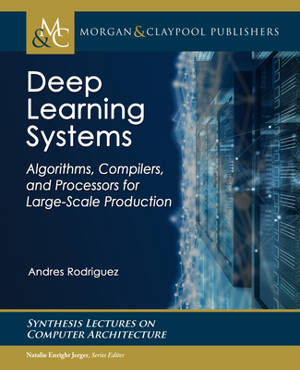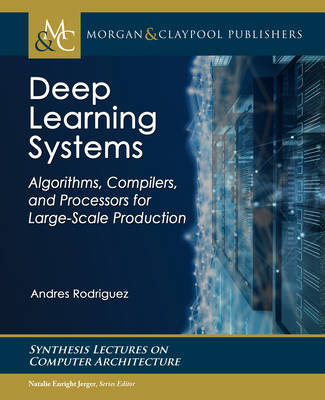
- Retrait gratuit dans votre magasin Club
- 7.000.000 titres dans notre catalogue
- Payer en toute sécurité
- Toujours un magasin près de chez vous
- Retrait gratuit dans votre magasin Club
- 7.000.0000 titres dans notre catalogue
- Payer en toute sécurité
- Toujours un magasin près de chez vous
Deep Learning Systems
Algorithms, Compilers, and Processors for Large-Scale Production
Andres RodriguezDescription
This book describes deep learning systems: the algorithms, compilers, and processor components to efficiently train and deploy deep learning models for commercial applications.
The exponential growth in computational power is slowing at a time when the amount of compute consumed by state-of-the-art deep learning (DL) workloads is rapidly growing. Model size, serving latency, and power constraints are a significant challenge in the deployment of DL models for many applications. Therefore, it is imperative to codesign algorithms, compilers, and hardware to accelerate advances in this field with holistic system-level and algorithm solutions that improve performance, power, and efficiency.
Advancing DL systems generally involves three types of engineers: (1) data scientists that utilize and develop DL algorithms in partnership with domain experts, such as medical, economic, or climate scientists; (2) hardware designers that develop specialized hardware to accelerate the components in the DL models; and (3) performance and compiler engineers that optimize software to run more efficiently on a given hardware. Hardware engineers should be aware of the characteristics and components of production and academic models likely to be adopted by industry to guide design decisions impacting future hardware. Data scientists should be aware of deployment platform constraints when designing models. Performance engineers should support optimizations across diverse models, libraries, and hardware targets.
The purpose of this book is to provide a solid understanding of (1) the design, training, and applications of DL algorithms in industry; (2) the compiler techniques to map deep learning code to hardware targets; and (3) the critical hardware features that accelerate DL systems. This book aims to facilitate co-innovation for the advancement of DL systems. It is written for engineers working in one or more of these areas who seek to understand the entire system stack in order to better collaborate with engineers working in other parts of the system stack.
The book details advancements and adoption of DL models in industry, explains the training and deployment process, describes the essential hardware architectural features needed for today's and future models, and details advances in DL compilers to efficiently execute algorithms across various hardware targets.
Unique in this book is the holistic exposition of the entire DL system stack, the emphasis on commercial applications, and the practical techniques to design models and accelerate their performance. The author is fortunate to work with hardware, software, data scientist, and research teams across many high-technology companies with hyperscale data centers. These companies employ many of the examples and methods provided throughout the book.
Spécifications
Parties prenantes
- Auteur(s) :
- Editeur:
Contenu
- Nombre de pages :
- 265
- Langue:
- Anglais
- Collection :
Caractéristiques
- EAN:
- 9781681739663
- Date de parution :
- 26-10-20
- Format:
- Livre broché
- Format numérique:
- Trade paperback (VS)
- Dimensions :
- 190 mm x 235 mm
- Poids :
- 462 g

Les avis
Nous publions uniquement les avis qui respectent les conditions requises. Consultez nos conditions pour les avis.






